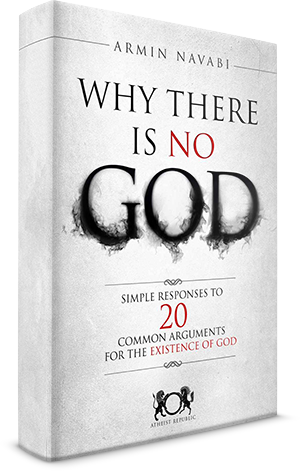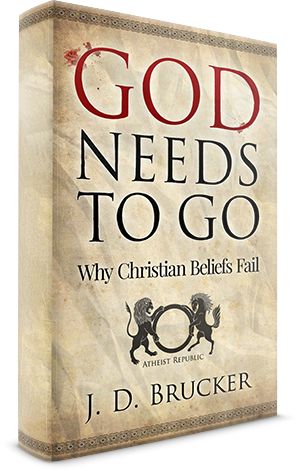My response (below) to the internet atheist cliche: "You can't prove a negative."
FIRSTLY...
The claim is false, it is possible to prove a negative.
For example, I can prove (as more likely true than its opposite) :
- That there is no German money in my wallet.
- That there is not a one inch sized picture of the Queens head on my tea cup next to me.
- That my house is not made of oranges.
- That the prime minister of England is not a six year old girl.
- That there is no dog currently sat in my car.
etc...
SECONDLY...
If by saying, "You can't prove a negative" one actually means to say, "One can not prove a negative with absolute certainty.” Then this could be said to be equally true of proving a positive. For on the one hand (the negative) although our beliefs can be argued as not being certain due to limited knowledge; on the other hand (the positive) it could be argued our beliefs can not be certain due to possible cognitive/sensory malfunction.
THIRDLY...
If there are two competing and opposite propositions and you claim one of them is more likely true than its opposite (and that others should believe this), then you are making a positive knowledge claim and you have a burden of proof.
You do not need to prove a negative with certainty, you just need to show it is more likely true than false.
There are three ways you can show a proposition over its opposite as being more likely true; please click on the link below for more information:
https://www.facebook.com/notes/atheist-answers/how-a-proposition-is-weig...
FOURTHLY...
If it is true that there are no (possible) rational reasons which could support the claim that, ‘negative proposition (-X) is more likely true than false’ (which is not true, anyway), then all that would rationally follow from this is that one should not believe that the negative proposition is true over its positive opposite, or believe it is more likely true than false over its opposite.
The atheist cliche (above) is tantamount to saying, "There are no rational reasons to support belief in this negative claim..." with the added position, "...and there can never be any rational reason to support a negative claim as more likely true over its opposite positive claim."
Rationally we should only believe a claim over its opposite when we have rational reason to do so (not just blindly assume it), if a negative claim really does lack any rational reason to believe it and could never have any rational reason to believe it in principle, then we should not believe the negative claim as true or more likely true over its equal and opposite positive claim; yet a lot of people who say you can not prove a negative [because there are no rational reasons for belief in it] at the same time believe the negative claim is more likely true than its opposite positive claim.
There is also no principle which shows if a claim is negative it is more likely to be true than its equal and opposite claim (both are ultimately just claims about a set of affairs in reality). Let me give you some examples to demonstrate this:
(X: Positive Claim) The jumper I am wearing has a right sleeve.
(-X: Negative Claim) The jumper I am wearing has no right sleeve.
(X: Positive Claim) There are more stars which exist beyond those stars we have currently discovered.
(-X: Negative Claim) There are no more stars which exist beyond those stars we have currently discovered.
(X: Positive Claim) There is currently fuel in the petrol tank of my car.
(-X: Negative Claim) There is currently no fuel in the petrol tank of my car.
(X: Positive Claim) There is gold somewhere else in the universe other than earth.
(-X: Negative Claim) There is no gold somewhere else in the universe other than earth.
ETC...
As you can see there is no principle which makes a negative claim more likely true than its opposite positive claim. Rather each claim above is independent from other negative/positive claims and is weighed (for showing one as rationally justified over the other) on the three methods which I have given above (attached in the link).
FIFTHLY...
In the end of the day, this internet atheist cliche is claiming...
(A) In principle there are no possible REASONS one could have for believing a negative proposition as true or more likely true than its negation/opposite, and/or...
(B) If one could find REASONS for believing a negative proposition as true or more likely true, in principle it is not possible that any of these REASONS would/could be RATIONAL REASONS.
...which is clearly false. We can clearly see that there are rational reasons one could possibly have for believing a negative propositions as true or more likely true than false.
In the end of the day evidence is just a set of affairs (A) found in reality which rationally infer to supporting conclusion (X) or (-X).
One should not confuse there being no reason/evidence to support a claim with there being in principle no possible reason/evidence to support a claim. There may be no reason/evidence to support a certain negative claim because it is false, not because it is not possible in principle; especially if someone finds reason/evidence to support its opposite positive claim (if it is possible to support a positive claim (X) with reason/evidence then it is possible therefore in principle to support claim (-X) with reason/evidence; again, don’t confuse no available reason/evidence VS in principle there being no possible reason/evidence).
God bless
Subscription Note:
Choosing to subscribe to this topic will automatically register you for email notifications for comments and updates on this thread.
Email notifications will be sent out daily by default unless specified otherwise on your account which you can edit by going to your userpage here and clicking on the subscriptions tab.





























I don't think you can prove any of those things.
You do not think I can prove the proposition...
(-A) The prime minister of England is not a six year old girl.
...as more likely (rationally) true than the proposition...
(A) That the prime minister of England is a six year old girl.
Wow an ex post facto edit! At least you didn't waste my time with pages of conversation before exhibiting how dishonest you are. For that, I am thankful.
Actually I edited because you were too lazy to read my second/third point which explains the issue you tripped up on (so it is edited for lazy people, not because I needed to do it for people who would read the entire article).
The second point is:
//
SECONDLY...
If by saying, "You can't prove a negative" one actually mean to say, "One can not prove a negative with absolute certainty.” Then this could be said to be equally true of proving a positive. For on the one hand (the negative) although our beliefs can be argued as not being certain due to limited knowledge; on the other hand (the positive) it could be argued our beliefs can not be certain due to possible cognitive/sensory malfunction.
//
//
THIRDLY...
If there are two competing and opposite propositions and you claim one of them is more likely true than its opposite, then you are making a positive knowledge claim and you have a burden of proof.
You do not need to prove a negative with certainty, you just need to show it is more likely true than false.
There are three ways to support a proposition over its opposite as being more likely true; please click on the link below for more information:
https://www.facebook.com/notes/atheist-answers/how-a-proposition-is-weig...
//
Those if statements in 2 and 3 don't apply to me.
----------------------------------------------------------------------------------
You said you could prove the things on that list. I'm guessing you can't. If you can; I'd like to see it.
Thirdly states: "You do not need to prove a negative with certainty, you just need to show it is more likely true than false."
My point is that I explicitly stated above what I mean by 'prove' and in other places implicitly mention it.
The only reason I edited what I said above, is not to make you look silly but to stop anymore confusion.
Now lets forget all this silliness and get to the real issue (on what I am actually saying; whether I did a good job of explaining it or not), do you not think I can prove the proposition...
(-A) The prime minister of England is not a six year old girl.
...as more likely (rationally) true than the proposition...
(A) That the prime minister of England is a six year old girl.
No "The Interlocuter" (what the hell does that even mean) you edited it because you are wrong.
You don't even know what my name means, when you could do a simple google check. So if you are incapable of even doing that before asking the question, why should I believe your unfounded assertion over my own internal experience which informs me exactly why I edited it?
You are the same guy that spoke nonsense on the other post; by nonsense I mean you just threw insults and made no attempt at a reasoned argument based on the content of what I had said.
Is there a way to block someone on this forum?
@Goofball
Definition of interlocutor
1 :one who takes part in dialogue or conversation
2 :a man in the middle of the line in a minstrel show who questions the end men and acts as leader
You are no leader. Your assumptions on this thread are at best adolescent. You'd like to apologize for your god by the means of trying to prove something that is a falsehood. It doesn't matter anyway because the bottom line is that you can't prove your god. All this distraction and false premise bullshit is just an example of your desperation.
I don't give a fuck what you think of me.
You can't ever bridge the gap of proving a god.
Apologist like you use:
1) The everything is orderly premise...which is false.
2) Intelligent Design premise...which is false.
3) First cause prime mover premise...which is false.
4) Now the I can prove a negative....which is false.
You embark on word salad because you think a long boring dissertation will confuse and make you seem intelligent. It won't, it doesn't, and you aren't.
I don't speak "nonsense". I speak bluntly. You can't handle blunt in your face truths and facts, that is why you resort to word salad distractions.
I have explained this before, but for YOUR benefit I will explain it again.
Even if you prove a negative, even if you succeed creating a logical sequence of theorems that meet common sense, at some point you have to prove your god, and also prove that your god did anything. That is an impossibility. It can't be done, has never been done, and won't ever be done, especially by you.
I don't give a good fuck what you call yourself. When I said about your moniker, I wasn't saying that I didn't know what the term meant. I was stating I don't how it could ever apply to you so much so that you would name yourself that. If you didn't understand that (and apparently you didn't) you are simpler than I first thought.
everytime a christian/believe attempts to appear intelligent with word salad, pseudo-science, fuzzy math, ill-fated philosophy, revisionist history, they just prove to be both stupid and ignorant. You have accomplished that. Congratulations!
Your "thirdly" point offers an alternative to proving; and that is great! Unfortunately you did say you could prove it, so it would be nice if you could do that for us.
----------------------------------------------------------------------------
Only after the fact with a rather underhanded edit.
----------------------------------------------------------------------------
If I was a betting man; I'd wager everything I own, V.S. a penny that you will be unable to preform that task.
You can prove some negatives. Can you prove that nothing exists outside of space and time?
Can you prove that I had not had pizza for breakfast? There are ifs involved... If you followed me all day and watched everything I put in my mouth and you recorded it, you could, hypothetically prove that I did not have pizza for breakfast. But a lot of scenarios are contingent upon big ifs. You're not exactly wrong, but you're not exactly right either. Anyway, what was your point?
My points are stated above, so I am not sure why you are questioning the point I was making.
In regards to this claim: "Can you prove that nothing exists outside of space and time?"
If it is impossible for any attempt in forming a reason to support the proposition...
(-X) Nothing exists outside time and space.
...then it is equally impossible for any attempt in forming a reason to support the proposition:
(X) Something exists outside time and space.
However, people have made attempts to form reasons for (X), so (-X) has the same possibility (if the reasons are on its side).
All we need are better reasons to support one proposition over its opposite to be rationally justified in believing it. That is one of the points of my article basically.
So to summarize: it is possible to prove a negative as more likely true than its opposite positive proposition; maybe not ALL negatives (however, I lean toward possibility for all), however, any negatives which suffer that issue its opposite positive proposition would suffer it too.
The point of my comment was: most of what you said is solid. You don't seem to disagree with the quote that you can't prove a negative in the sense that you can't necessarily prove that it is more likely than three positive and you disagree with the quote as a statement of absolute truth. I find that more theists, however, say that you can't prove a negative. Much less on the atheist side who tend to lean more towards the negative (by definition) you are well-versed in logic, it seems, but I asked what your point was because it seems in your op that you already understand the ifs and the sometimes of the issue and you aren't particularly taking a strong stance for or against anything. But I may have missed that part. So I want to be clear what the purpose of your post is before I comment on anything other than your examples of negatives you can prove. I know you can, you know you can. I know there are somethings you can't and you know it. What is the message to be taken away from your otherwise logically sound statements?
I read your reply quickly (as I am looking after my son and I am in desperate need of finishing my computer science studies), so you need to forgive me if I misunderstood you and/or don't answer everything you asked of me.
Basically, this post and the other post (which you commented on) were written in response concerning two issues I see coming from the internet atheist camp, they are:
(1) That they believe it is more likely God does not exist than exist (not just 50/50), however, they think they are rationally justified to just blindly assume this (ironically, while calling Theism a blind faith and claiming the Theist must prove every fine point of doctrine etc...).
(2) The claim that one can not prove a negative (when they are asked to shoulder their burden of proof for the claim God is less likely to exist than exist), however, while ironically still maintaining the belief God is less likely to exist than exist.
I do have a positive position, I am a Christian Theist. This is mainly due to a strong experience I had of God, however, I do also have many inferential arguments which I think rationally justify belief in God.
I spoke with another member of this page (on the other post), and I told him my aim for the next article on this forum (probably will be a while before I do it though); I will copy and paste what I said (so that you can keep your eyes open for it if you are interested):
//
...If you noticed in this article I talk about how a proposition always has to have a reason for belief one way or the other (even if that reason is just a blind assumption), and then how we can check to see if that reason is rationally valid. I then stated that the belief can be inferential (so we can check the reason using the straight forward rules of rational inference) or non-inferential (I stated for this position the assessment is made for rational justification depending on ones epistemic model; normally that will asses the circumstance in which the non-inferential belief arises - like in an experience for example).
Well, I am going to write an article soon on how one could have belief in God without inferential argument and still be rationally justified for that belief (the second issue of rational justification would be based on internal justification; however, this is a debate in epistemology between Internalists and Externalists). So keep your eyes peeled for that one :D
//
All right. I get it now. Cool.
I do look forward to your future post. I look forward to pointing out any and all flaws in your argument, if any.
Without giving you any heads up on specifics I will tell you that if you try to argue that it is fifty/fifty or above to the positive that a specific god exists and that you know the attributes of this specific god it will (likely)be an uphill battle for you. Especially if you use the methods of determining what is more likely true that you so precisely laid down earlier (which I agree with).
Of course, what you will actually say is completely unknown to me at this time. So game on.
Also... I'm glad you cleared up the whole: 'you can't prove a negative' thing. I agree that if that is the defense for a positive claim for a negative of another positive claim then it is wrong. I recognize this and carefully choose my words(as should others). To say that 'god does not exist' is a positive claim and does bear the burden of proof. And if you can't show it, you don't know it. However I don't see his as a very popular position, at least not from the atheists that I've encountered... Most will say: 'I don't believe a god exists' and it bears no burden of proof.
This should be elementary. As should the laws of logic. Non contradiction, the excluded middle and the law of identity.
@AU
Thank you for that clarification. I'd come to the same conclusion but wasn't sure it was the right one. I mean, Interlocutor presenting a positive claim as a negative one.
@ Keith. Right right. The thing is... Why I jumped in the way I did was that I immediately recognized that The Interlocutor has a somewhat advanced knowledge of logic, well above the average, and so has a good potential for making a lot of challengers look ridiculous (especially if they are not as familiar with epistemology, ontology and the Socratic method in general). My aim was to clarify and perhaps keep challengers of his position on topic. When he presented, for instance, the law of the excluded middle and ways of determining which proposition is more likely true than the other he was right on point. Objections were raised based on a misunderstanding or perhaps ignorance of the laws and terminology of logic. I don't really want anyone to look ridiculous for those reasons.
Perhaps I'll start a topic outlining the basics of formal and informal logic.
Thank you, that's a very good idea. Although I've read some philosophers ( Plato and Socrates included ) I don't have your knowledge or your intellect, nor that of the Interlocutor, come to that. What I do have is that inbuilt British stoicism that helps me recognise bullshit when I see it, although I might fully understand WHY it's bullshit. Or, to put it another way, I can sometimes smell the bullshit before I see where it is. I hope you'll for give me for using the term 'bullshit' - it's not one that I would normally use in debates.
The Interlocutor
If you can prove that something exist outside of space and time, please do so. Provide the testable evidence, that can pass peer review. Then you can claim your Nobel.
It is no wonder that philosophy has brought very little knowledge about reality to us. Mathematics is the partner of science. Philosophy is the partner of religion. Prove nothing, disprove nothing. Does philosophy matter in the 21st century?
@Chimp3
I think that, if you read philosophy, you'd understand that not all philosophers were supporters of religion, and that practically none of the modern ones are. Philosophy, particularly Socrates, helps you understand how to debate in a logical way. Socrates proposed the dialectic method of enquiry - it's worth looking up.
I have read Socrates. A few others too. My claim stands.
Philosophy is the sandbox ideas play in until they gain rigor.
Better said !
@Nyar
Agreed. But that's exactly why it's still relevant.
@keith, @chimp3 and nyarlathotep
Please correct me if I am wrong for I am not well versed in this but,
When we speak of if a god is real the yes we can philosophically argue different points ideas and a 50/50 stance is I don't know.
But as soon as someone defines said god and gives a book explaining what that god is and what that god commands, then we have jumped from the what if into positive claims. This is when I feel we can attack those positive claims with evidence against using science.
Again I am not well versed in philosophy.
I agree. Religion is not only about nebulous deities. Claims are made about life origins, medicine and healing, disease, flying horses, levitations, the dead returning to life. These are not philosophical claims.
@Chimp3
It seems to me that all of those things could be considered as philosophical points. Philosophy is defined as -
the study of the fundamental nature of knowledge, reality, and existence, especially when considered as an academic discipline.
Then what great facts about reality has philosophy brought to the table recently? You quoted the word"study" . What facts has this study brought except arguments about the word "fact"?
Pages